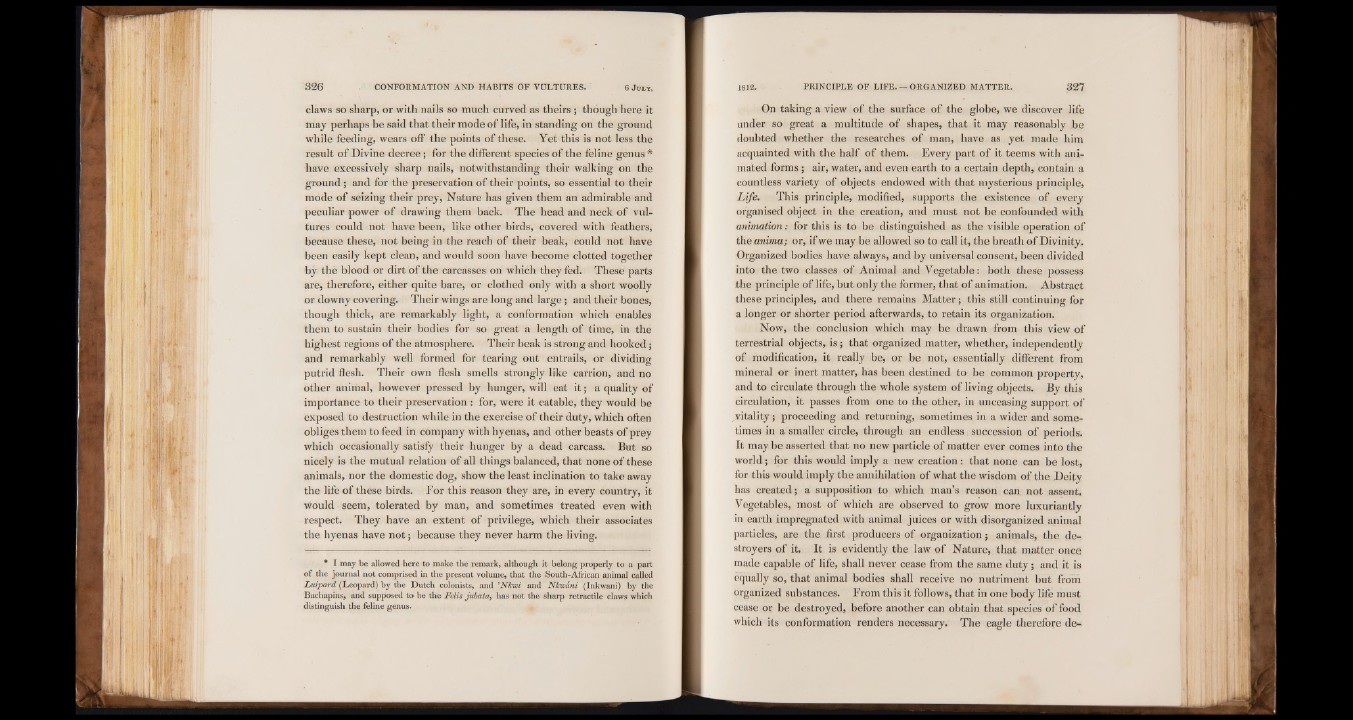
claws so sharp, or with nails so much curved as theirs ; though here it
may perhaps be said that their mode of life, in standing on the ground
while feeding, wears off the points of these. Yet this is not less the
result of Divine decree ; for the different species of the feline genus *
have excessively sharp nails, notwithstanding their walking on the
ground ; and for the preservation of their points, so essential to their
mode of seizing their prey, Nature has given them an admirable and
peculiar power of drawing them back. The head and neck of vultures
could not have been, like other birds, covered with feathers,
because these, not being in the reach of their beak, could not have
been easily kept clean, and would soon have become clotted together
by thè blood or dirt of the carcasses on which they fed. These parts
are, therefore, either quite bare, or clothed only with a short woolly
or downy covering. Their wings are long and large ; and their bones,
though thick, are remarkably light, a conformation which enables
them to sustain their bodies for so great a length of time, in the
highest regions of the atmosphere. Their beak is strong and hooked ;
and remarkably well formed for tearing out entrails, or dividing
putrid flesh. Their own flesh smells strongly like carrion, and no
other animal, however pressed by hunger, will eat it ; a quality of
importance to their preservation : for, were it eatable, they would be
exposed to destruction while in the exercise of their duty, which often
obliges them to feed in company with hyenas, and other beasts of prey
which occasionally satisfy their hunger by a dead carcass. But so
nicely is the mutual relation of all things balanced, that none of these
animals, nor the domestic dog, show the least inclination to take away
the life of these birds. For this reason they are, in every country, it
Would seem, tolerated by man, and sometimes treated even with
respect. They have an extent of privilege, which their associates
the hyenas have not ; because they never harm the living.
* I may be allowed here to make the remark, although it belong properly to a part
of the journal not comprised in the present volume, that the South-African animal called
Luipard, (Leopard) by the Dutch colonists, and ’Nkwi and Nkwdni (Inkwani) by the
Bachapins, and supposed to be the Felis jubata, has not the sharp retractile claws which
distinguish the feline genus.
On taking a view of the surface of the globe, we discover life
under so great a multitude of shapes, that it may reasonably be
doubted whether the researches of man, have as yet made him
acquainted with the half of them. Every part of it teems with animated
forms; air, water, and even earth to a certain depth, contain a
countless variety of objects endowed with that mysterious principle,
Life. This principle, modified, supports the existence of every
organised object in the creation, and must not be confounded with
animation: for this is to be distinguished as the visible operation of
the anima; or, if we may be allowed so to call it, the breath of Divinity.
Organized bodies have always, and by universal consent, been divided
into the two classes of Animal and Vegetable: both these possess
the principle of life, but only the former, that of animation. Abstract
these principles, and there remains Matter; this still continuing for
a longer or shorter period afterwards, to retain its organization.
Now, the conclusion which may be drawn from this view of
terrestrial objects, is; that organized matter, whether, independently
of modification, it really be, or be not, essentially different from
mineral or inert matter, has been destined to be common property,
and to circulate through the whole system of living objects. By this
circulation, it passes from one to the other, in unceasing support of
vitality; proceeding and returning, sometimes in a wider and sometimes
in a smaller circle, through an endless succession of periods.
It may be asserted that no new particle of matter ever comes into the
world; for this would imply a new creation: that none can be lost,
for this would imply the annihilation of what the wisdom of the Deity
has created; a supposition to which man’s reason can not assent.
Vegetables, most of which are observed to grow more luxuriantly
in earth impregnated with animal juices or with disorganized animal
particles, are the first producers of organization; animals, the destroyers
of it. It is evidently the law of Nature, that matter once
made capable of life, shall never cease from the same duty; and it is
equally so, that animal bodies shall receive no nutriment but from
organized substances. From this it follows, that in one body life must
cease or be destroyed, before another can obtain that species of food
which its conformation renders necessary. The eagle therefore de